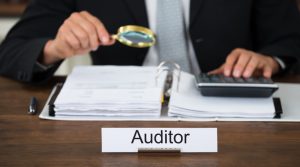Are you interested in pursuing a career as an auditor? If so, you’ve come to the right place. In this step-by-step guide, we will walk you through everything you need to know about becoming an auditor. From understanding what an auditor does and the qualifications required, to the skills needed for success in this field and the best certifications to pursue, we’ve got you covered. We’ll also explore the different types of auditors and the benefits of choosing this profession. Whether you’re just starting out or looking to switch careers, this guide will provide you with valuable insights and actionable steps to help you achieve your goal of becoming an auditor.
What is an Auditor?

An auditor is an individual who is responsible for examining the financial statements of a company and issuing an opinion as to whether or not the statements are presented fairly, in all material respects, in accordance with generally accepted accounting principles. The auditor’s opinion is expressed in a report that is issued to the company’s management and board of directors.
The auditor’s report will either state that the financial statements are presented fairly, in all material respects, in accordance with generally accepted accounting principles (GAAP), or it will qualify the opinion by stating that the financial statements are not presented fairly, in all material respects, in accordance with GAAP. A qualified opinion indicates that there are some aspects of the financial statements that do not meet GAAP requirements.
The auditor’s report is an important tool for investors, creditors, and other users of the financial statements when making decisions about whether or not to invest in or lend money to a company.
What Aoes an Auditor Do?

An auditor’s job is to review an organization’s financial statements and ensure that they are accurate and compliant with generally accepted accounting principles (GAAP). This involves looking at things like the company’s revenue, expenses, assets, liabilities, and equity. The auditor will also assess the internal controls of the organization to make sure that there are adequate safeguards in place to prevent fraud and error. After completing the review, the auditor will issue a report detailing their findings.
How to Become An Auditor?

Becoming an auditor typically involves a combination of education, professional experience, and certification. Auditors are responsible for reviewing financial records, examining processes, and ensuring compliance with relevant laws and regulations. Here’s a step-by-step guide on how to become an auditor:
1. Obtain the necessary education
Most auditors have at least a bachelor’s degree in accounting, finance, or a related field. Consider enrolling in a reputable university or college that offers a relevant degree program.
2. Gain relevant work experience
While some entry-level positions may be available for recent graduates, many auditing roles require some prior work experience in accounting or finance. You can gain this experience through internships, part-time jobs, or by working in related fields.
3. Specialize in auditing
As you gain experience, try to focus on roles and projects that involve auditing or examining financial records and processes. This specialization will make you more attractive to potential employers and prepare you for a career as an auditor.
4. Consider professional certifications
While not always mandatory, obtaining a professional certification can significantly boost your credibility as an auditor. The most widely recognized certification for auditors is the Certified Public Accountant (CPA) designation, but there are other relevant certifications such as Certified Internal Auditor (CIA) or Certified Information Systems Auditor (CISA) if you plan to focus on specific types of audits.
5. Stay updated on regulations and industry standards
Auditing is a dynamic field, and regulations are subject to change. Stay informed about the latest updates in auditing practices, financial reporting standards, and industry-specific guidelines.
6. Develop strong analytical and communication skills
Auditors need to analyze complex financial data and communicate their findings clearly and concisely. Work on improving your analytical abilities and develop effective communication skills.
7. Network and build professional relationships
Attend industry events, join relevant professional organizations, and connect with auditors or accounting professionals in your area. Networking can help you stay informed about job opportunities and industry trends.
8. Apply for auditor positions
Once you have the necessary education, experience, and certifications, start applying for auditor positions with public accounting firms, corporations, government agencies, or non-profit organizations.
9. Prepare for interviews
Be ready to discuss your education, experience, and skills in auditing. Showcase your ability to work independently and as part of a team, your attention to detail, and your commitment to maintaining professional ethics.
10. Continue professional development
After becoming an auditor, continue to pursue professional development opportunities, such as attending workshops, seminars, and earning additional certifications. Staying current in your field will enhance your career prospects and ensure you remain effective in your role.
Qualifications of an Auditor

To become an auditor, you need to meet certain qualifications. First, obtain a bachelor’s degree in accounting, finance, or a related field. Then, pursue professional certifications such as Certified Public Accountant (CPA) or Certified Internal Auditor (CIA). Gain practical experience through internships or entry-level positions in auditing. Develop strong analytical, communication, and problem-solving skills. Stay updated with industry regulations and advancements through continuing education. Build connections within the auditing profession to enhance career opportunities.
What are the Best Auditor Certifications?

Some of the top auditor certifications include the Certified Internal Auditor (CIA), Certified Information Systems Auditor (CISA), and Certified Public Accountant (CPA). These certifications are offered by reputable organizations such as the Institute of Internal Auditors (IIA) and ISACA. They focus on different aspects of auditing, such as internal audit practices and auditing information systems.
Types of Auditors

Types of auditors include internal auditors, external auditors, government auditors, forensic auditors, and IT auditors. Internal auditors work within organizations to assess and improve internal controls and risk management. External auditors are independent professionals who review financial statements for accuracy and compliance. Government auditors ensure public entities comply with laws and regulations. Forensic auditors investigate financial fraud and misconduct. IT auditors specialize in assessing data security and integrity.
Benefits of Becoming an Auditor

Auditors enjoy high earning potential, with competitive salaries that increase as they gain experience. Job security is another benefit, as auditors are in demand and offer stable employment opportunities. Becoming an auditor opens up diverse career options across industries and sectors, allowing for flexibility and specialization. Professional growth is a key advantage, as auditors need to continuously learn and stay updated with industry regulations. Finally, auditors contribute to organizational success by ensuring the accuracy and integrity of financial information, enabling informed decision-making.
Conclusion
In conclusion, becoming an auditor can be a rewarding career choice for those who have a keen eye for detail, strong analytical skills, and a passion for ensuring accuracy and compliance. With the right qualifications, skills, and certifications, you can establish yourself as a trusted professional in the field of auditing. The demand for auditors is high in various industries, providing you with opportunities for growth and advancement. If you’re interested in pursuing a career as an auditor, take the first step by exploring our comprehensive guide on how to become an auditor. It provides step-by-step instructions and valuable insights to help you kick-start your journey. Start your path to becoming an auditor today!









